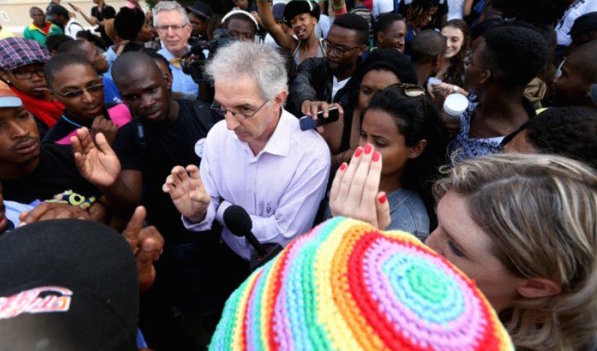
The past few weeks have been quite eventful in South Africa. Tens of thousands of college students demonstrated in different cities to speak-up against a proposed double-digit rise in university tuition fees. The protests led to a movement that some qualify as the biggest mobilisation in South Africa since the liberation from apartheid in 1994. Students marched all the way to President Jacob Zuma’s office in Pretoria. Under pressure, Zuma held a press conference where he announced that tuition fees will be reduced by 6% in 2016. On the aftermath of this crisis, some wealthy families have offered to help University of Cape Town students who cannot afford to pay their tuition bill.
Easing tensions
Max Price, the University of Cape Town vice-chancellor, disclosed the measures taken to ease tensions and find a way to solve problems. A deal between the University of Cape Town and the National Education Health and Allied Worker’s Union was reached and the following services will be insourced: cleaning of residences (Metro), cleaning of university buildings (Supercare), catering in student residences (C3), grounds and gardening services (Turfworks), campus protection services (G4S) and student and staff transport services (Sibanye). This measure will provide full-time employment with benefits to 900 employees.

{adinserter CNP5}
Offering need-based aid
In addition, wealthy parents, alumni and corporates asked the university to set up a special fund to which they were willing to make tax-free donations. This fund will help provide need-based financial aid to the needy.
“We’ve been really happy to receive offers, many from the parents and families of wealthier students who understand the problems of funding higher education, who acknowledge that they can afford the fees that we charge […] They are saying they are willing to pay the increases in order to ensure that other people have better access and that the quality of education that we offer at UCT is preserved,” Price said.

Finding long-term solutions
Price admitted that long-term and sustainable solutions also need to be adopted. Different options such as an income-based tuition fees are being explored.
“We need to protect the poor. those who can afford these increases must pay. For me it means we cannot support the call for free university education for all but for only the poor,” Price told the press.
This statement seconds what Higher Education Minister Blade Nzimande told Parliament’s higher education and training portfolio committee last week. Nzimande said that for the moment, the government’s policy was to provide free education only for the poor.

SEE ALSO: LeBron James Is Going To Provide 2300 4-Year College Scholarships To The Youth.







